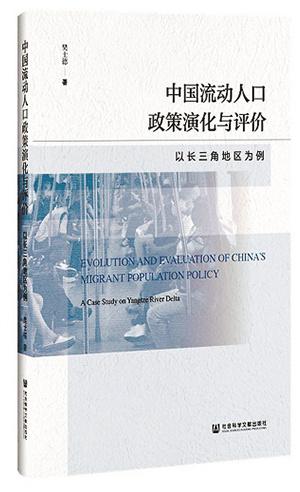Migrant population policy of Yangtze Delta
Author : ZHANG JUWEI Source : Chinese Social Sciences Today 2021-09-28

Evolution and Evaluation of China’s Migrant Population Policy:A Case Study on Yangtze River Delta
Evolution and Evaluation of China’s Migrant Population Policy: A Case Study on Yangtze River Delta explores the dynamic evolution of China’s migrant population policy, its internal mechanism, and subsequent economic and social effects, based on hundreds of policy texts and the design of a series of policy indicators.
Its author Fan Shide, a professor from the School of Economics at Nanjing Audit University, examines policies on the migrant population’s household registration, medical insurance, and the compulsory education their children receive. He also conducts international and regional double comparisons and policy evaluations.
Academic circles often confuse macro-socio-economic policies on the migrant population with micro-interventions of local governments, collectively referring to them as migrant population policy. The author clearly groups them into macro-policies and micro-interventions.
Policy changes at the central level and micro-regulations at the local level play a subtle role in population mobility. Its internal mechanism is embodied in the dynamic interactions and checks and balances among multiple economic entities, especially between the central government and local governments, the local governments of developed and underdeveloped areas, and the migrant population and the developed areas or urban residents. The most typical form of complex interactions happens among the migrant population, urban residents, and policy.
The household registration policy for the migrant population in the Yangtze Delta has successively undergone a strict control phase, a gradual loosening phase, and a deepening reform phase. The policy of Jiangsu Province, Zhejiang Province, and Shanghai Municipality within the delta has both commonalities and differences. In terms of commonality, the policy is constructed under the macro-framework of the central household registration reform policy, policy orientations favoring urban residents have gradually changed, and mutual barriers have been somewhat reduced. On the other hand, differences are exhibited in the direction of the household registration reform, the degree of tightness of restrictions on household registration transfers, and the speed of the reform process.
Fan conducts a regional policy comparison of the Yangtze River Delta region with the Pearl River Delta region and the Beijing-Tianjin-Hebei region. Additionally, he makes an international comparison with developed countries and regions such as the United States, the European Union, and Japan. The author highlights mutual particularities and differences among regions and among countries while probing their general and common traits. In doing so, he provides a decision-making reference for the Yangtze River Delta region to optimize their migrant population policy and realize the smooth flow and effective agglomeration of human resources in a wider range.
Zhang Juwei is director and a research fellow of the Institute of Population and Labor Economics at the Chinese Academy of Social Sciences.
Ye Shengtao made Chinese fairy tales from a wilderness
Ye Shengtao (1894–1988) created the first collection of fairy tales in the history of Chinese children’s literature...
-
How northern ethnicities integrated into Chinese nation
2023-09-18
-
Mogao caves
2023-09-12
-
Mogao Grottoes as ‘a place of pilgrimage’
2023-09-12
-
Time-honored architectural traditions in China
2023-08-29
-
Disentangling the civilizational evolution of China
2023-08-28
-
AI ethics in science fiction
2023-08-23














 2011-2013 by www.cssn.cn. All Rights Reserved
2011-2013 by www.cssn.cn. All Rights Reserved